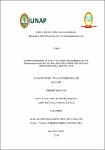| dc.contributor.advisor | Pinedo Cancino, Viviana Vanessa | es_PE |
| dc.contributor.advisor | Tresierra Ayala, Álvaro Benjamín | es_PE |
| dc.contributor.author | Donayre Urquizo, Marilly Katyane | es_PE |
| dc.contributor.author | Pinedo Sotelo, Saby Maricielo | es_PE |
| dc.date.accessioned | 2021-01-06T04:55:10Z | |
| dc.date.available | 2021-01-06T04:55:10Z | |
| dc.date.issued | 2019 | |
| dc.identifier.uri | http://repositorio.unapiquitos.edu.pe/handle/20.500.12737/6926 | |
| dc.description.abstract | Este estudio se realizó con el objetivo de evaluar la respuesta inmune humoral de anticuerpos IgG de pobladores de las comunidades de Mazán (MZ) y Zungarococha (ZG) contra las proteínas recombinantes Falstatin y GEST de Plasmodium vivax (Pv), comparándose la respuesta inmunitaria en ambas proteínas y determinando la comunidad que presente mayor respuesta inmune. Un total de 211 muestras de plasma (91 pertenecientes a MZ y 120 a ZG) fueron evaluadas por ensayo de inmunoabsorción ligado a enzimas (ELISA) empleando el estándar de referencia MSP-1 de P. vivax con la misma cantidad de muestras para comparar lo obtenido. Los resultados mostraron que la proteína GEST presentó 25% de seropositividad y Falstatin sólo 12%, sin embargo, estos porcentajes fueron menores a lo observado en MSP-1 (44%). Al comparar la seropositividad de las proteínas entre las comunidades de estudio se observó que solo GEST y MSP-1 presentaron diferencias significativas mostrando mayor proporción de seropositivos en la comunidad de ZG (30,76%; 54,62%). En la reactividad de anticuerpos IgG, tanto GEST y Falstatin no presentaron diferencias significativas; sin embargo, fueron más reactivos en comparación a MSP-1. Al evaluar la respuesta de anticuerpos IgG frente a cada antígeno por comunidad, se mostraron diferencias significativas entre los antígenos GEST y MSP-1 en MZ y ZG, determinándose que Zungarococha es la comunidad que presentó mayores títulos de anticuerpos IgG frente a GEST y MSP-1. El estudio ha demostrado respuesta inmune frente a nuevas proteínas recombinantes de Plasmodium vivax, proporcionando así un aporte con el fin de desarrollar una vacuna eficaz. | es_PE |
| dc.description.abstract | This study was carried out with the objective of evaluating the humoral immune response of IgG antibodies from residents of the communities of Mazán (MZ) and Zungarococha (ZG) against the recombinant proteins Falstatin and GEST of Plasmodium vivax (Pv). It compares the immune response that produces each protein and determines the community with the highest immune response. A total of 211 plasma samples (91 belonging to MZ and 120 to ZG) were evaluated by enzyme-linked immunosorbent assay (ELISA) using the P. vivax MSP-1 reference standard with the same number of samples. The results showed the GEST protein had 25% seropositivity and Falstatin only 12%, however, these percentages were lower than those observed in MSP-1 (44%). When were compared protein seropositivity between study communities, it was obtained that only GEST and MSP-1 showed significant differences. The highest proportion of seropositives was found in the ZG community (30.76%; 54.62%). In relation to IgG antibody reactivity results, both GEST and Falstatin did not showed significant differences; however, they were more reactive compared to MSP-1. When evaluating the response of IgG antibodies to each antigen by community, significant differences were detected between the GEST and MSP-1 antigens in MZ and ZG, determining that Zungarococha is the community that had the highest titers of IgG antibodies against GEST and MSP- 1 The study has obtained an immune response against new recombinant Plasmodium vivax proteins, thus providing a contribution in order to develop an effective vaccine. | es_PE |
| dc.format | application/pdf | es_PE |
| dc.language.iso | spa | es_PE |
| dc.publisher | Universidad Nacional de la Amazonía Peruana | es_PE |
| dc.rights | Attribution-NonCommercial-NoDerivs 3.0 United States | es_PE |
| dc.rights | info:eu-repo/semantics/openAccess | es_PE |
| dc.rights.uri | http://creativecommons.org/licenses/by-nc-nd/3.0/us/ | * |
| dc.source | Repositorio institucional - UNAP | es_PE |
| dc.source | Universidad Nacional de la Amazonía Peruana | es_PE |
| dc.subject | Inmunogenicidad vacunal | es_PE |
| dc.subject | Proteínas recombinantes | es_PE |
| dc.subject | Plasmodium vivax | es_PE |
| dc.title | Inmunogenicidad de dos proteínas recombinantes de Plasmodium vivax en plasma de pobladores de Mazán Y Zungarococha, Iquitos, 2015 | es_PE |
| dc.type | info:eu-repo/semantics/bachelorThesis | es_PE |
| thesis.degree.discipline | Ciencias Biológicas | es_PE |
| thesis.degree.grantor | Universidad Nacional de la Amazonía Peruana. Facultad de Ciencias Biológicas | es_PE |
| thesis.degree.name | Biólogo(a) | es_PE |
| thesis.degree.program | Presencial | es_PE |
| dc.subject.ocde | http://purl.org/pe-repo/ocde/ford#1.00.00 | es_PE |
| renati.author.dni | 46322693 | |
| renati.author.dni | 70246198 | |
| renati.advisor.dni | 05416925 | |
| renati.advisor.dni | 05373274 | |
| renati.type | http://purl.org/pe-repo/renati/type#tesis | |
| renati.discipline | 511206 | |
| renati.level | http://purl.org/pe-repo/renati/level#tituloProfesional | es_PE |
| renati.juror | Mori Del Águila, Teresa de Jesús | |
| renati.juror | Cachique Pinche Mirley | |
| renati.juror | Reátegui Bardales, Carmen Teresa | |
| dc.publisher.country | PE | es_PE |
| dc.publisher.country | PE | es_PE |


